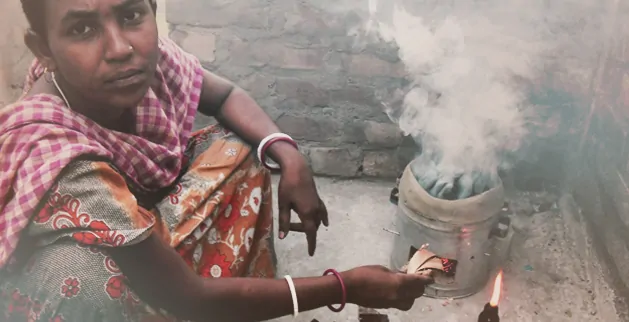
It was our first morning in our new home in an Indian slum, and smoke was pouring in our windows and door. We were able to close the windows, but the steel grate we have for a door left us at the mercy of the wind. We looked outside and saw that it was just our next door neighbor starting up her coal-burning stove—something she had done every morning for years. This was our first up close and personal experience of a problem that still faces about 2.7 billion people globally. Little did we know the focus cooking stoves would soon become for us.
Motivated by our faith and a desire to live and serve amongst the marginalized in the slums of India, we had just moved with our children to Kolkata to seek what might be an appropriate way for us as foreigners to love God and neighbor in a slum community. As we got to know our community we came to realize that many families use simple coal-, wood- or charcoal-burning stoves.
And it wasn’t long before we realized the significant health problem this poses for our neighbors.
According to the World Health Organisation (WHO), traditional biomass (such as wood) and coal stoves—used by almost half of the world’s population—cause about 2 million deaths annually. One million of these deaths are due to chronic obstructive pulmonary disease, and nearly another million are the result of pneumonia in children under the age of 5.
Indoor air pollution from simple coal and biomass stoves is also a cause of heart disease, stroke, cataract and various cancers. Since women are typically the ones doing the cooking, and children are usually around and about the small—often one-room—home, they are the ones who receive the brunt of the sickness dealt to them by their need to cook and eat on a very low budget.
Perhaps what is most tragic is that all of these deaths are preventable—through cleaner and more efficient stoves.
After observing these health risks as a real issue in our new community, we wanted to know how our neighbors felt about it. Did they recognize the smoke from their stoves as being a problem and have the desire for change, or were their stoves and the cooking culture associated with them too deeply entrenched in their local culture?
To help us understand the stove culture and receptivity to change, we had a neighbor conduct a community survey with several hundred residents. The results were overwhelmingly informative. Nearly everyone who uses wood, coal or charcoal stoves recognizes that the smoke causes sickness in their family, and would love to try another option if it was available. This told us it’s not just the development professionals from outside that recognize the issue. People on the ground have a lot of energy for a better way, too—which is often a crucial factor in affecting change.
There are various types of improved, clean burning stoves that could potentially be offered to replace traditional ones. Most improved stove projects are focused on rural areas, which are generally more homogenous than urban slums, and projects usually try to introduce one particular type of improved stove. Considering the opportunities available to us in an urban area though, we feel that providing people with some options for improved stove types is possible and will help us to be able to reach more families.
The most convenient, energy-efficient and cleanest burning type of stove available is LPG (gas). What’s more, the Indian government has an LPG subsidy scheme which actually makes the ongoing fuel cost less than what people currently need to pay to run their traditional stoves. It has been the significant upfront cost that has generally put LPG well beyond the reach of the poor.
However, another option that is more affordable is wood-gas stoves (also known as TLUD stoves). These stoves can use any kind of dry chunky biomass as a fuel—such as small pieces of waste wood from carpentry shops, or cut up and dried coconut shells. These stoves resourcefully turn the biomass into a gas, and then burn that gas. As a result, they emit almost no smoke and are a healthier alternative to traditional stoves often found in the developing world.
Families living in the slums are generally under a lot of financial pressure to provide for their basic necessities, and cooking fuel is one of the most significant day-to-day costs. The clean-burning stoves cost less to run than traditional ones. So when a family uses one of these stoves they can save money to put towards whatever it is that they need—be it more nutritious food, housing, medicines, school books for the kids or paying off a loan.
The clean-burning stoves are better for the environment, as well. They emit far less greenhouse gases than traditional stoves. And this is the key to us being able to heavily subsidize the stoves and bring them in reach of families in the slums.
Ashadesh is a social business that we have set up to sell carbon offsets that are generated by replacing traditional high-polluting stoves with clean-burning stoves. Carbon offsets reduce carbon emissions from one source (in our case by replacing traditional stoves with clean burning ones), in order to compensate for carbon emissions elsewhere, such as when you fly or drive your car. People in the West who recognize the reality of climate change and want to minimize their own carbon footprint can buy carbon offsets from the project. Their purchase is then used to fund stoves, which in turn reduces carbon emissions.
If our neighbors all transitioned away from traditional stoves and began using cleaner burning options, it would save them money, reduce carbon emissions and allow them to inhale less harmful smoke. They would breathe easier, and we as their global neighbors could breathe easier too.
Steve Wilson, along with his wife Jane have left their home and careers in Australia to move with their two children into an urban slum in Kolkata, India. They have started the social business ‘Ashadesh’ to work for positive change in the slums.





















